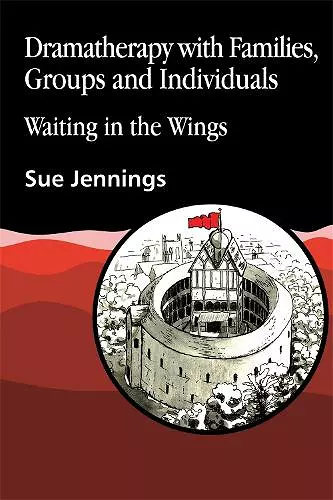Dramatherapy with Families, Groups and Individuals
Waiting in the Wings
Format:Paperback
Publisher:Jessica Kingsley Publishers
Published:1st May '92
Currently unavailable, and unfortunately no date known when it will be back

This book - by one of the leaders in this exciting and relatively new field - is the first to present a working framework for dramatherapists, social workers, family and marital therapists, and others conducting groups. This framework primarily deals with dramatherapy in the non-clinical setting such as family centres, residential children's homes, social services resources and intermediate treatment centres. Separate chapters cover current theory, methodology and application in specific client areas including child abuse. The author addresses work with children and adults, both individually and in groups, illustrated by case history examples. A final chapter concentrates on the needs of the therapist and shows how dramatherapy can be used as a personal resource.
Sue Jennings' book is essentially a teaching manual for practising dramatherapists, but by virtue of its general approach it will appeal to a much wider audience, and especially to those involved in any way with theatre or drama. Jennings' main argument is that dramatherapy is best understood - and activated - when it is treated as an art form rather than as a particular type of psychotherapy. Where psychotherapists will refer to theory or case histories for illumination, dramatherapists are more likely, and are well advised, to turn to plays, stories, myths or symbols as a way of understanding and resolving difficulties. Jennings gives a clear account of dramatherapy theory, fully illustrated by extensive reference to actual work with groups and individuals - while the question of the difference between dramatherapy and psychodrama is raised in innumerable books and articles, I have never found it answered as well as it is here. Psychodrama uses drama as a way of helping people get close to their problems, whilst dramatherapy takes action and images (often archetypal rather than personal) as a means of distancing group members from their life situations, and yet, paradoxically, helping them to understand those situations better. As Jennings puts it, "The paradox of drama is that we understand more about ourselves because we have played at being other people." Starting with Remedial Drama in 1973, Sue Jennings has written a series of important and influential books on dramatherapy, and, more than anyone else, has been responsible for the growth of dramatherapy as an independent professional discipline. This book deserves to take its place alongside the others on the shelves of anyone interested in drama or therapy. -- New Theatre Quarterly
Not only is it extremely well written, but the theoretical models and issues outlined are worked through with the use of detailed and clear examples... deserves to be widely read by specialists and non-specialists alike. -- Counselling
She shows an impressive knowledge of myths and dramatic literature and demonstrates their therapeutic validity. The case examples are wonderful. -- Dramascope
This is a clear, well-written text that reflects a dramatherapist who is clinically astute and well-grounded in drama, theatre, and ritual processes. There is no doubt that Jennings is a trailblazing pioneer whose journey makes ours a little easier. -- The Arts in Psychotherapy
ISBN: 9781853021442
Dimensions: 235mm x 158mm x 9mm
Weight: 260g
160 pages